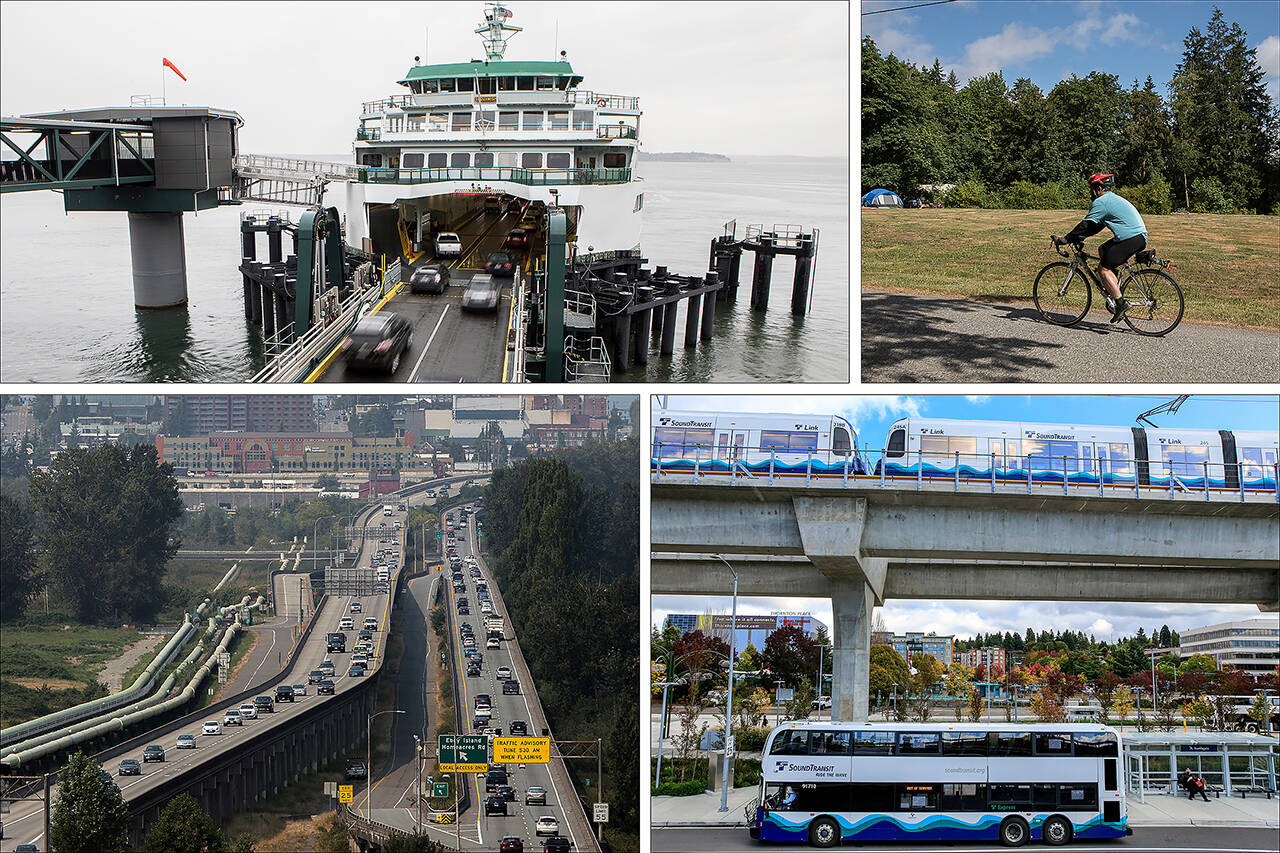OLYMPIA — Majority Democrats drove their ambitious $17 billion transportation spending plan to the finish line Wednesday amid continuing criticism from Republicans and ongoing questions bout how the money will eventually be spent.
The final version of the 16-year package, dubbed Move Ahead Washington, emerged from a conference committee on a party-line vote. It will be voted on in the full House and Senate on Thursday, the final day of the 2022 legislative session.
The package’s billions of dollars will be spent on highway preservation, bridge maintenance, road projects, transit expansion, fish-barrier removal, and bike, bus and pedestrian programs. There’s money to build four electric state ferries and to allow anyone under the age of 18 to ride free on buses, trains and ferries.
Sen. Marko Liias, D-Everett, chair of the Senate Transportation Committee and one of the package’s authors, said Move Ahead “is going to invest in every corner of the state in a responsible way.”
He touted the free fares and added dollars for bicycle programs, saying they will help “raise a whole generation of multi-modal users.”
Around $600 million will be poured into Snohomish County projects such as the Grove Street railroad overpass in Marysville, widening the Bothell-Everett Highway and adding a third express toll lane to I-405 through Bothell.
To pay for it, Democrats are counting on several sources of revenue, including an unprecedented reliance on the state general fund.
Under the deal, $2 billion will be transferred this year to kick-start investments.
Then, each year beginning in 2024, there will be transfers of $57 million from each of two accounts — the general fund and the public works assistance account — into transportation. Future legislatures are expected to abide the commitments, though they are not required to.
This arrangement marked a compromise between House and Senate Democrats.
Originally, Liias proposed a tax on exported fuel that drew a storm of opposition from leaders of neighboring states and Republicans. House Democrats countered with a yearly sweep of $100 million from the public works account, which local governments rely on for sewer, water and utility projects.
As for the rest of the package funding, about $5.4 billion will come from the cap-and-trade system established in the Climate Commitment Act and $3.5 billion from the Federal Infrastructure Investment and Jobs Act.
There’s no gas tax increase as in past transportation packages. But Democrats penciled in $2.3 billion from boosting several vehicle-related fees. License plate fees, for example, would rise by $8 for a motorcycle replacement and $40 for a new car, starting in July.
On Wednesday, when the conference committee of four Democrats and two Republicans convened, the GOP members said that while the package contains some good things, they were frustrated with being left out of the process.
“There was absolutely no input from my side of the aisle. In my opinion that shortchanges the citizens of Washington,” said Sen. Curtis King, R-Yakima, the ranking Republican on the Senate Transportation Committee. He played a key role in crafting the 2015 Connecting Washington package.
Rep. Carolyn Eslick, R-Sultan, voiced similar frustration. Eslick, who did not serve on the conference committee, is a member of the House Transportation Committee.
“Unfortunately, this year the majority party did not involve Republicans in the process, and instead pressed forward with a plan that unnecessarily increases taxes and fees on license plates and driver’s licenses and prioritizes some areas over others,” she said. “I was pleased, however, to see $210 million for the Highway 2 trestle. Although the project needs more funding, this is a good start.”
Democrats didn’t apologize for going it alone. They anticipated Republican opposition to uses of the cap-and-trade revenue and their approach that puts less emphasis on building new roads than previous packages.
“We have a different vision of what our state’s transportation system should be,” said Rep. Jake Fey, D-Tacoma, leader of House Transportation Committee.
Lawmakers will be passing two bills related to the package. One covers the sources of revenue. The other covers how dollars will be spent.
That legislation only covers this year and next. Details on where money will go in the other 14 years is a task for the next session of the Legislature.
“That’s the biggest casualty of a 60-day session. There’s not enough time,” Liias said. “We’ll work with the Department of Transportation during the interim to make sure we’re responsibly spending the money.”
Here are some of the major projects in Snohomish County slated for funding:
• $210 million for the U.S. 2 trestle replacement and capacity improvements. Most of that would be for design, engineering and environmental work, not construction.
• $46 million to replace the Highway 525 bridge in Mukilteo, near the former ferry terminal.
• $30.5 million to complete funding for the interchange project at I-5 and Highway 529 in Marysville.
• $30 million for Community Transit to build and expand Swift bus rapid transit service. Three lines would split the money evenly: Green, Gold and Silver, the latter being a proposed future connection between the Seaway Transit Center in Everett and Highway 9 at Cathcart Way.
• $25 million for bus lane work on Highway 99 between Lynnwood and Everett.
• $22.5 million to revitalize Highway 99 in Lynnwood, in Liias’ district.
• $20 million for Lynnwood’s Poplar Way bridge project.
• $20 million to bolster connections to the light rail station at the 164th Street SW and the I-5 interchange.
• $12.9 million for a pedestrian bridge over north Broadway near Everett Community College and WSU Everett.
• $10 million to widen part of Highway 522.
• $8.4 million for Paine Field access work on 100th Street SW.
Herald writer Ben Watanabe contributed to this report.
Jerry Cornfield: 360-352-8623; jcornfield@heraldnet.com; Twitter: @dospueblos.
Talk to us
> Give us your news tips.
> Send us a letter to the editor.
> More Herald contact information.

























